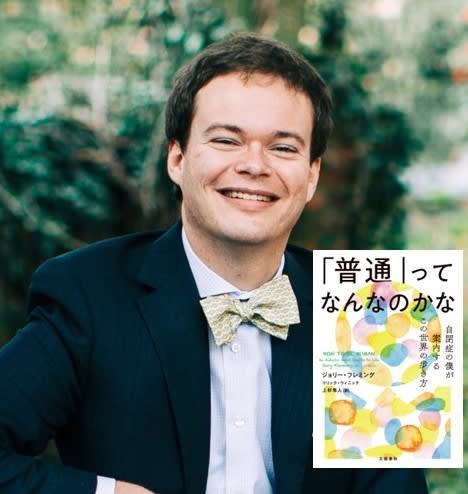「普通」ってなんなのかな――自閉症の僕が案内するこの世界の歩き方
ジョリー・フレミング/リリック・ウィニック 著、上杉隼人 訳
文藝春秋
「図書新聞」 No.3589 ・ 2023年04月29日
■「自閉症でない人が、自閉症について理解できるとは思えません。不可能です。同じように、僕も自閉症でない人たちのことがわからない。自閉症でない人が自閉症でないことを一生懸命説明して、自閉症の人が自閉症のことを一生懸命に説明しても、おたがい『わからないよ』と首をかしげたり肩をすくめたりするだけじゃないかな」(本書7ページ)。
ジョリー・フレミング(二十八歳)は五歳で自閉症と診断され、普通の小学校には受け入れてもらえなかった。毎日の生活でもさまざまな困難をずっと抱えてきた。そんなジョリーが高校に進学して卒業し、大学を四年で卒業した。そしてイギリスの名門オックスフォード大学のローズ奨学金を得てオックスフォード大学の修士号(地理環境学)を得た。今は母校サウスカロライナ大学の研究員をしている。ジョリー本人も含めて、誰にも考えられないことだった。
「本書はあなたをインスパイアし、あなた自身と周りの人々の精神をより深く省みさせてくれるだろう」。
『スティーブ・ジョブズ』や『レオナルド・ダ・ヴィンチ』で知られるベストセラー作家、ウォルター・アイザックソンは、『「普通」ってなんなのかな』の推薦文にそう記している。
ジョリーの物語は、定型発達者の頭脳を持たない人が定型発達者の頭脳のために構築された世界に住むのは一体どんな感じか、わたしたちに窓を開いて見せてくれる。われわれが「人間らしい」「普通」と思いこんでいる精神とちょっと違う精神や考え方はどんなものか、実際に示してくれるのだ。本書につづられたジョリーの人生の旅を通して、ウォルター・アイザックソンが言うように、読者は自分たちの心の中をのぞき込み、考えさせられることになる。
わたしたちは自分たちと障がい者の違いを見出すことで、自分たちが「普通」であると考えているだけではないだろうか?
「僕がみんなについて知らないことがあるのと同じように、みんなも僕について知らないことはある。でも、だからと言って、僕たちが同じヴィジョンを持ったり、団結して同じ目標に向かって突き進むことができない、というわけじゃない」(本書203ページ)。
だが、この言葉からわかるように、ジョリー・フレミングは定型発達者と自閉症の人たちがともに支えあうよりよい社会を作り出したいと考えている。
二〇一六年七月、神奈川県相模原市でおそろしい事件が起こった。自閉症の人を含む障がい者の福祉施設で、十九人が死亡し、二十六人が負傷し、十三人が重傷を負った。容疑者の「意思疎通のとれない障がい者は安楽死させるべきだ」などというおそろしい発言の数々に日本中が強い怒りを覚え、深い悲しみに包まれた。
ジョリー・フレミングは日本版に特別収録された「『日本版附章』ジョリーは今」で、このおそろしい事件についてコメントしている(このインタビューはYouTube動画でも観られる。https://www.youtube.com/watch?v=hpZwF7pivCo)。
「僕は願っています。将来、あらゆるものを取り込める社会の建設が進められて、より多くの愛とケアが注ぎ込まれる。そうすれば、今言及されたような恐ろしい事件は少なくなるはずです」。ジョリーはそんな社会において、誰もが役割を担うとする。「一緒によりよい社会を作り出せるはずです。人間の歴史の一部である愛とケアにあふれ、これまで僕らの周りで起こってしまい、今も世界のどこかで起こっている悪いことはほとんど見られない社会。そんなすばらしい社会を僕らは一緒に作り出せるのです」(本書243ページ)。
この美しき驚くべき青年(ウォルター・アイザックソンはジョリー・フレミングをこのように言っている)は、笑顔が障がい者と定型発達者の関係において緩衝材として機能し、よりよい社会を作り上げると信じている。四月二日の世界自閉症啓発デーに向けて、ジョリー・フレミングは日本の読者にメッセージを送ってくれた。
「意識して笑顔を作ったり、やさしい言葉をかけたりすることで、いろんな関係にすごくいいものが広がっていきます。そんなふうに心に留めていれば、もしかしたら愛を持って人を受け入れるのがちょっとだけ楽になるかもしれません」。
※本稿は『朝日ウィークリー』2558号(二〇二三年四月二日)に英文で寄稿した記事を筆者が日本語に翻訳したものである。
(編集者/翻訳者/英文ライター・インタビュアー/英語講師)
「図書新聞」No.3589 ・ 2023年04月29日(土)に掲載。 http://www.toshoshimbun.com/books_newspaper/index.php
「図書新聞」編集部の許可を得て、投稿します。

JuliaはSesame Streetのキャラクターの一人だ。
Muppet Wikiには以下の説明がある。
https://muppet.fandom.com/wiki/Julia
Julia is a four-year-old girl with autism from Sesame Street, introduced in 2015 as part of the Sesame Street and Autism: See Amazing in All Children initiative. She is a young girl with bright orange hair and big green eyes and is friends with Elmo and Abby.
Julia's characterization was originated by Leslie Kimmelman for the digital storybook We're Amazing, 1, 2, 3! She used her own experiences as the mother of a child with autism, as well as input from research and advisers from the autism community, to inform the story.
この映像からもわかるとおり、とても楽しい女の子だ。
https://www.youtube.com/watch?v=dKCdV20zLMs
ジュリアは世界自閉症啓発デー(毎年4月2日)のキャラクターでもある。
http://www.worldautismawarenessday.jp/htdocs/
------------------------------------------
ジュリアは自閉症の女の子
セサミストリートには、多様性豊かなキャラクターがたくさん登場します。
「ジュリア」は、自閉症の特性があるキャラクターです。
〇ジュリアの紹介
セサミストリートに住むジュリアは、自閉症の特性がある女の子です。みんなと同じように、ジュリアも遊ぶことが大好きですが、少し違った遊び方をすることがあります。
「みんなちがって、みんないい。」セサミストリートの仲間達はそんなジュリアのことが大好きです。
---------------------------------
世界自閉症啓発デーのサイトに記されているように、自閉症について知っておきたいことがある。
大変光栄なことに、上杉はこの世界自閉症啓発デーにあわせて、ジョリー・フレミングと『「普通」ってなんなのかな 自閉症の僕が案内するこの世界の歩き方』について、有力紙を含むいくつかの媒体で英語で記事を書かせていただくことになりました。
英語で記事を書くのは大変ですし、APやReutersの記者が書く英語の記事と並んで掲載されるので大プレッシャーですが、ジョリーにもしっかり見てもらい、いいものに仕上げたいと思います。
ジョリー・フレミング『「普通」ってなんなのかな 自閉症の僕が案内するこの世界の歩き方』について、担当編集者の高橋夏樹さんが、翻訳出版部長の永嶋俊一郎さんと語り合うポッドキャスト、ぜひお楽しみください!
「翻訳の部屋」第11回は『「普通」ってなんなのかな』。幼い頃に自閉症と診断された著者ジョリー・フレミングさんが、世界をどう見て、どうつきあっているかを語る一冊です。この本の魅力と、そこに見出せる学びについて、担当編集タカハシに訊きます。
『「普通」ってなんなのかな 自閉症の僕が案内するこの世界の歩き方』が刊行されました。
https://books.bunshun.jp/ud/book/num/9784163916538
上杉のTwitterで本書に収録されたジョリーの言葉を毎日一つずつ紹介してます。
ハッシュタグ、
#ジョリーの名言
#普通ってなんなのかな
で検索してみてください。
今日はこの言葉をツイートしました。
https://twitter.com/GetUpEnglish/status/1620580615715422209
-------------------------------------------------------------------------
マラリアを根絶するのは明らかにいいことだけど、自閉症を取り除くことで社会はよくなるのかな?
社会は自閉症を受け入れるむずかしさをあれこれ考えるんじゃなくて、自閉症によってもたらされるすばらしさをこれからは認めるべきじゃないかな?
-------------------------------------------------------------------------
英語は以下のとおりです。
The benefit of removing malaria is very clear, but would removing autism actually benefit society? Should society change to recognize the benefits of autism instead of just the challenges?
いつもそうですが、英語の複数を日本語にするのはなかなかむずかしいです。ここではchallenge(むずかしさ)がchallengesと複数になっている、「むずかしさ」がひとつではなくて、いくつもあることがわかります。「むずかしさたち」なんてできませんから、どうするか?
その場合は「副詞的な言い方を使って複数ある感じを出す」のがいいと思います。ここでは「…のむずかしさをあれこれ考える」としてみたのですが、いかがでしょう。
『「普通」ってなんなのかな 自閉症の僕が案内するこの世界の歩き方』はジョリーの前向きでやさしい表現があふれています。
ぜひ上杉隼人のTwitterを毎日チェックしてください。
上杉隼人/GetUpEnglishのTwitterで
https://twitter.com/GetUpEnglish
本日より、ジョリー・フレミング、リリック・ウィニック『「普通」ってなんなのかな 自閉症の僕が案内するこの世界の歩き方』(上杉隼人訳、文藝春秋)からジョリー・フレミングの言葉を毎日ひとつずつ紹介します。
ぜひ「#ジョリーの名言」でチェックしてみてください。(リツイートもよろしお願いします!)
本日の言葉はこちらです。↓
https://twitter.com/GetUpEnglish/status/1619170327199911936
上杉隼人/GetUpEnglishのTwitterで
https://twitter.com/GetUpEnglish
のフォローもどうかよろしくお願いします。
明日、ジョリー・フレミング、リリック・ウィニック『「普通」ってなんなのかな 自閉症の僕が案内するこの世界の歩き方』(文藝春秋)が刊行となる。
https://books.bunshun.jp/ud/book/num/9784163916538
刊行にあたってPR動画も制作した。
https://www.youtube.com/watch?v=s_At-2d2BYs
本日のGetUpEnglishはこの動画の最後に出てくるジョリーのメッセージを紹介する。
We can build a better community together—one that expresses more love and care that’s a part of our human history and less of the bad things that have occurred in the world around us in the past and are happening today as well.
人間の歴史の一部である愛とケアにあふれ、これまで僕らの周りで起こってしまい、今も世界のどこかで起こっている悪いことはほとんど見られない社会。
そんなすばらしい社会を僕らは一緒に作り出せるのです。
ダイバーシティがあたりまえになった今だから読みたい一冊。(The book should be read now when diversity is considered to be everything in our life.)
副題に「自閉症の僕が案内するこの世界の歩き方」があるように、ジョリーは「この世界」、すなわち「定型発達者が普通であると考えている世界」で生きていくために、いろんな苦労をしてきたし、これからもそうだろう。そんな彼の考え方と脳の動きが、自閉症である本人の口から聞くことができるのが本書の最大の魅力だ。これまでこうした本はなかった思う。
ジョリー・フレミング、リリック・ウィニック『「普通」ってなんなのかな 自閉症の僕が案内するこの世界の歩き方』を、多くの方に手に取っていただけたら、すごくうれしいです!
ジョリー・フレミング、リリック・ウィニック『「普通」ってなんなのかな 自閉症の僕が案内するこの世界の歩き方』(上杉隼人訳、文藝春秋)
ジョリー・フレミング
リリック・ウィニック
上杉隼人[訳]
文藝春秋
1月25日刊行!
https://twitter.com/bunshun_
https://books.bunshun.jp/ud/book/num/9784163916538
著者にインタビューし、PR動画も作りました。
--------------------------
PR Video
https://www.youtube.com/watch?
An Interview with Jory Fleming by Hayato Uesugi
https://youtu.be/hpZwF7pivCo
Jory Fleming talking about the Sagamihara stabbings
https://youtu.be/nbOpu5wtBaM
--------------------------
『「普通」ってなんなのかな 自閉症の僕が案内するこの世界の歩き方』見本出来!
https://books.bunshun.jp/ud/book/num/9784163916538
---------------------------------
「普通」ってなんなのかな 自閉症の僕が案内するこの世界の歩き方
ジョリー・フレミング
リリック・ウィニック
上杉隼人
定価:2,750円(税込)
発売日:2023年01月25日
ジャンル:ノンフィクション
作品紹介
ウォルター・アイザックソン(『スティーブ・ジョブズ』『コード・ブレーカー』著者)激賞!
「美しく、驚くべき若者による、美しく、驚くべき本だ。本書はあなたをインスパイアし、あなた自身と周りの人々の精神をより深く省みさせてくれるだろう」
ジョリーは自閉症。
ずっと、みんなとうまくやれなかった。
普通の小学校にも入れなかった。
でも彼は自分なりに世界と、人間と向き合った。
そして気づけば高校を卒業し、大学も出て、イギリスのオックスフォード大学院に進み、修士号を取って、研究者になった。
本書はそんなジョリー・フレミングが世界と人間をどう見て、どう考えて、どうつきあっているかを語る本だ。
「自閉症でない人が、自閉症について理解できるとは思えない。僕も、自閉症でない人たちのことがわからない。お互い一生懸命説明しても、『わからないよ』って肩をすくめるだけじゃないかな」
そう苦笑するジョリーは、立派な研究者になった今も、自閉症でない「普通」の人=「定型発達者」と同じ思考法をマスターしたわけではない。言葉の使い方は苦手だ。みんなの感情もよくわからない。毎日大変な苦労をしているし、周囲とうまくやっていくために精神エネルギーを使い果たしてしまうこともある。
だからジョリーは本書で自閉症の人たちを代弁しようとか、自閉症を克服できるようアドバイスしようとか、自閉症を一言で説明しようとか、そういうことはしていない。
ただ彼は、自閉症でない「普通」の人たちのためにつくられた世界で、自閉症の頭脳をもつ人がどうやって思考し、生きているのかを少しだけ見せてくれる。
われわれが「人間らしい」「普通」と思いこんでいる精神とちょっと違う精神や考え方がどんなものかをのぞかせてくれるのだ。
そこには意外な気づきや発見や、もしかしたらちょっとした救いがあるかもしれない。
われわれが行き詰まっているこの世界を軌道修正するための、ちょっとしたヒントもあるかもしれない。
ダイバーシティがあたりまえになった今だから読みたい一冊。
日本版のために、著者にオンラインインタビューを行い、本人の近況から、『自閉症の僕が飛びはねる理由』の東田直樹氏へのメッセージや、やまゆり園事件までを語る附章を特別収録。
目次
1 診断「自閉症」
2 脳内空間
3 エネルギーと記憶
4 感情の隔たり
5 言葉の障壁
6 言葉が伝わらない
7 個性は選択
8 大切なこと
9 メッセージは一言、愛。
10 日本版附章「ジョリーは今」
商品情報
書名(カナ) フツウッテナンナノカナ ジヘイショウノボクガアンナイスルコノセカイノアルキカタ
ページ数 296ページ
判型・造本・装丁 四六判 上製 上製カバー装
初版奥付日 2023年01月30日
ISBN 978-4-16-391653-8
Cコード 0098
著者
ジョリー・フレミング
リリック・ウィニック
上杉 隼人翻訳
ジョリー・フレミング、リリック・ウィニック『「普通」ってなんなのかな 自閉症の僕が案内するこの世界の歩き方』が今月25日に発売となる。
https://books.bunshun.jp/ud/book/num/9784163916538
現在、PR動画を鋭意製作中。
それにあわせて、宣伝文を英語に訳した。
2022年12月30日と12月31日、2023年1月1日につづいて、本日のGetUpEnglishでも、わたしの英訳を、英語便(https://www.eigobin.com)のネイティブチェックとあわせてご紹介する。
以下のコピーをどんな英語にしたらいいか?
-------------------
そこには意外な気づきや発見や、もしかしたらちょっとした救いがあるかもしれない。
われわれが行き詰まっているこの世界を軌道修正するための、ちょっとしたヒントもあるかもしれない。
ダイバーシティがあたりまえになった今だから読みたい一冊。
--------------------
わたしは次のように訳した。
There might be an unexpected discovery or awareness as well as salvation.
We might get a small tip to change our dead-end society.
The book should be read now when diversity is considered to be all in our life.
英語便の修正は以下の通り。
There might be an unexpected discovery or awareness as well as salvation.
We might get a small tip as to how to change our dead-end society.
The book should be read now when diversity is considered to be all everything in our life.
英語便の講師のコメントがすばらしい。
We get a tip + as to how to + do something.
These days, it's considered to be "everything." "All" is unclear here.
「今の日々」はeverythingで受けるのがいいとはためになるアドバイスだ。
最後に、以下の一文をどう訳すか。
日本版のために、著者にオンラインインタビューを行い、本人の近況から、『自閉症の僕が飛びはねる理由』の東田直樹氏へのメッセージや、やまゆり園事件までを語る附章を特別収録。
わたしは情報を足しつつ、こう訳した。
The Japanese translation includes Jory Fleming's interview. He talks about his recent activity and sends message to Naoki Higashida. Furthermore, he extends his deepest sympathy to those who were died at a care home for disabled people including people with autism in Sagamihara, Kanagawa in 2016, as well as their family.
英語便の修正は以下の通り。
The Japanese translation includes a Jory Fleming interview. He talks about his recent activity and sends a message to Naoki Higashida. Furthermore, he extends his deepest sympathy to those who were died killed at a care home for disabled people including people with autism in Sagamihara, Kanagawa in 2016, as well as their families.
コメントはすべてためになる。
Use "a" and then "Jory Fleming" as an adjective before the noun "interview." Or you can say: "...includes an interview with Jory Fleming."
One message so add "a" here.
They were "killed" by someone. Just "died" is normal.
Plural for all the different "families" of the people who were killed.
「aを付けてJory Flemingをinterviewの形容詞として使う」とはまさにネイティブ添削だ。
今年も間違いなく英語便にすごくお世話になる。
PR動画も大体できた! 近日公開予定!
ジョリー・フレミング、リリック・ウィニック『「普通」ってなんなのかな 自閉症の僕が案内するこの世界の歩き方』が今月25日に発売となる。
https://books.bunshun.jp/ud/book/num/9784163916538
現在、PR動画を鋭意製作中だ。
それにあわせて、担当編集者の高橋夏樹さんが書いてくださった以下の名コピーを英語に訳した。
2022年12月30日と12月31日のGetUpEnglishでも、わたしの英訳を、英語便(https://www.eigobin.com)のネイティブチェックとあわせてご紹介する。
本日はこの部分を訳してみよう。
---------------------
だからジョリーは本書で自閉症の人たちを代弁しようとか、自閉症を克服できるようアドバイスしようとか、自閉症を一言で説明しようとか、そういうことはしていない。
ただ彼は、自閉症でない「普通」の人たちのためにつくられた世界で、自閉症の頭脳をもつ人がどうやって思考し、生きているのかを少しだけ見せてくれる。
われわれが「人間らしい」「普通」と思いこんでいる精神とちょっと違う精神や考え方がどんなものかをのぞかせてくれるのだ。
-----------------------------
だからジョリーは本書で自閉症の人たちを代弁しようとか、自閉症を克服できるようアドバイスしようとか、自閉症を一言で説明しようとか、そういうことはしていない。
は次のように訳した。
Jory does not want to be a poster role for people with autism or think he can provide an easy answer key to autistic understanding. He never considers he can advise how to deal with autism.
英語便のこの英訳に関するコメントは、
Good comment.
で、直しなし!
ただ彼は、自閉症でない「普通」の人たちのためにつくられた世界で、自閉症の頭脳をもつ人がどうやって思考し、生きているのかを少しだけ見せてくれる。われわれが「人間らしい」「普通」と思いこんでいる精神とちょっと違う精神や考え方がどんなものかをのぞかせてくれるのだ。
は、次のように訳した。
Jory’s story is a window into how people with autism live in a world constructed for neurotypical brains. We can notice a little bit different mentality and way of thinking from the ones we consider are norm or humane.
これに対する英語便の修正はこのとおり。
Jory’s story is a window into how people with autism live in a world constructed for neurotypical brains. We can notice a little bit slightly different mentality and way of thinking from the ones we consider are norm or humane.
コメントがすばらしい。このように記されている。
Either we can notice "a slightly different mentality" using the adverb "slightly," or we can say "we can notice a mentality that is a little bit different." Basically, we can't place "a little bit different" directly before "mentality."
"Humane" is kind and anti-cruelty. We want our pets to die humanely (by injection) when they become old and sick. Are you sure this is the word you want here?
a little bit slightly different mentalityの変更は問題ないが、なるほど「人間らしい」をhumaneとしたが、これだど「やさしい、人情ある」の意味が強調されてしまい、ここではふさわしくない言い方になってしまうようだ。
よって、「人間らしい」を「普通の人らしい」という言い方にすればいいから、ordinaryがぴったりだろう。あるいはnormとordinaryが重なるから、どちらか省くという手もある。
この件、英語便の講師にふたたびネイティブチェックに出して、今言ったことを説明してたずねてみた上で、どちらかに決めることにする。
Jory’s story is a window into how people with autism live in a world constructed for neurotypical brains. We can notice a slightly different mentality and way of thinking from the ones we consider are norm and ordinary.
PRビデオにも最終案を使う予定だ。
2023年も正月から大変勉強になった。
英語便のおかげだ!
みなさんにも英語便をお勧めしたい。無料トライアルも用意されているので、ぜひ試してみてほしい。
https://www.eigobin.com/trial/profile_regist.php
ジョリー・フレミング、リリック・ウィニック『「普通」ってなんなのかな 自閉症の僕が案内するこの世界の歩き方』が来月1月25日に発売となる。
https://books.bunshun.jp/ud/book/num/9784163916538
現在、PR動画を鋭意製作中だ。
それにあわせて、担当編集者の高橋夏樹さんが書いてくださった以下の名コピーを英訳した。
昨日につづいて、本日2022年12月31日のGetUpEnglishでも、わたしの英訳を、英語便(https://www.eigobin.com)のネイティブチェックとあわせてご紹介する。
本日はこの部分を訳してみよう。
---------------------------
本書はそんなジョリー・フレミングが世界と人間をどう見て、どう考えて、どうつきあっているかを語る本だ。
「自閉症でない人が、自閉症について理解できるとは思えない。僕も、自閉症でない人たちのことがわからない。お互い一生懸命説明しても、『わからないよ』って肩をすくめるだけじゃないかな」
そう苦笑するジョリーは、立派な研究者になった今も、自閉症でない「普通」の人=「定型発達者」と同じ思考法をマスターしたわけではない。言葉の使い方は苦手だ。みんなの感情もよくわからない。毎日大変な苦労をしているし、周囲とうまくやっていくために精神エネルギーを使い果たしてしまうこともある。
------------------------------
本書はそんなジョリー・フレミングが世界と人間をどう見て、どう考えて、どうつきあっているかを語る本だ。
は次のように訳した。
In How to Be a Human, Jory Fleming tells how he sees the world and people, thinking about and makes terms with them.
それに対して、英語便(https://www.eigobin.com)から次の修正が入った。
In How to Be a Human, Jory Fleming tells us how he sees the world and people, thinking and how he thinks about and makes comes to terms with them.
そしてコメントがすばらしい。
The verb "tell" requires an object, so you need to add something like "us" to refer to the readers. Alternatively, you can say Fleming "explains how he sees..."
We "come to terms" with the world around us. We do not "make terms."
なるほど、であれば、explainsを使ってこうしよう。
In How to Be a Human, Jory Fleming explains how he sees the world and people and how he thinks about and comes to terms with them.
つづいて、
「自閉症でない人が、自閉症について理解できるとは思えない。僕も、自閉症でない人たちのことがわからない。お互い一生懸命説明しても、『わからないよ』って肩をすくめるだけじゃないかな」
は次の文とあわせて、原書のジョリーの言葉を引用して、次のように対応した。
He laughs, “I’m certainly not expecting anyone to completely understand autism who doesn’t have it. That’s unreasonable. In the same way, I can’t fully understand them. Even if two people who are very well-intentioned try to explain it to each other, there will be some things where both of us will shake our heads or shrug our shoulders and be like, I can’t get there.”
そのあと、
そう苦笑するジョリーは、立派な研究者になった今も、自閉症でない「普通」の人=「定型発達者」と同じ思考法をマスターしたわけではない。言葉の使い方は苦手だ。みんなの感情もよくわからない。毎日大変な苦労をしているし、周囲とうまくやっていくために精神エネルギーを使い果たしてしまうこともある。
は次のように訳した。
Although now being an established researcher, Jory cannot think like a neurotypical person. He is still not good at speaking or reading what people feel. He has tremendous difficulties in his everyday life and sometimes expends all amount of mental energy he can use.
英語便の修正は以下の通り。
Although now being an established researcher, Jory cannot think like a neurotypical person. He is still not good at speaking or reading what people feel. He has tremendous difficulties in his everyday life and sometimes expends all amount of his mental energy he can use.
コメントがじつにすばらしい。
There is no need for "being" in this part of the sentence. The first main verb structure is later with "cannot think..." "Although now a teacher at Eigobin, Andrew used to work for Eiken."
Just "all his mental energy" is enough detail to make the point. The other words are unnecessary and too wordy.
beingがいらないという説明はすばらしいし、実際間違えてみると、The first main verb structure is later with "cannot think..."(主節はこのあと...cannot thinkで出てくるので、主語をan established researcherにあわせればいいといい)ということがよくわかる。
外国語の学習は、
①「話す」にしろ、「書く」にしろ、まず自分でやってみる
②それをネイティブに見てもらい
③修正されつつ、納得できる説明をもらう
ということが不可欠だ。英語便はすべて実現してくれる。
英語便のサービスはほとんど毎日使っているし、英語便なしではとっても今の仕事はできない。
力説したいのは、英語便のすばらしさはネイティブに英文ライティングを添削してもらえることだけではない。それを通じて、GetUpEnglishで繰り返し紹介してきたように、英語の基本的な使い方を教えてもらえることだ。
すべての英語学習者にお勧めしたい。無料トライアルも用意されているので、ぜひ試してみてほしい。
ジョリー・フレミング、リリック・ウィニック『「普通」ってなんなのかな 自閉症の僕が案内するこの世界の歩き方』が来月1月25日に発売となる。
https://books.bunshun.jp/ud/book/num/9784163916538
現在、PR動画を鋭意製作中だ。
それにあわせて、担当編集者の高橋夏樹さんが書いてくださった以下の名コピーを英訳した。
年末年始のGetUpEnglishは、わたしの英訳を、英語便(https://www.eigobin.com)さんのネイティブチェックとあわせてご紹介する。
---------------------------
作品紹介
ウォルター・アイザックソン(『スティーブ・ジョブズ』『コード・ブレーカー』著者)激賞!
「美しく、驚くべき若者による、美しく、驚くべき本だ。本書はあなたをインスパイアし、あなた自身と周りの人々の精神をより深く省みさせてくれるだろう」
ジョリーは自閉症。
ずっと、みんなとうまくやれなかった。
普通の小学校にも入れなかった。
でも彼は自分なりに世界と、人間と向き合った。
そして気づけば高校を卒業し、大学も出て、イギリスのオックスフォード大学院に進み、修士号を取って、研究者になった。
本書はそんなジョリー・フレミングが世界と人間をどう見て、どう考えて、どうつきあっているかを語る本だ。
「自閉症でない人が、自閉症について理解できるとは思えない。僕も、自閉症でない人たちのことがわからない。お互い一生懸命説明しても、『わからないよ』って肩をすくめるだけじゃないかな」
そう苦笑するジョリーは、立派な研究者になった今も、自閉症でない「普通」の人=「定型発達者」と同じ思考法をマスターしたわけではない。言葉の使い方は苦手だ。みんなの感情もよくわからない。毎日大変な苦労をしているし、周囲とうまくやっていくために精神エネルギーを使い果たしてしまうこともある。
だからジョリーは本書で自閉症の人たちを代弁しようとか、自閉症を克服できるようアドバイスしようとか、自閉症を一言で説明しようとか、そういうことはしていない。
ただ彼は、自閉症でない「普通」の人たちのためにつくられた世界で、自閉症の頭脳をもつ人がどうやって思考し、生きているのかを少しだけ見せてくれる。
われわれが「人間らしい」「普通」と思いこんでいる精神とちょっと違う精神や考え方がどんなものかをのぞかせてくれるのだ。
そこには意外な気づきや発見や、もしかしたらちょっとした救いがあるかもしれない。
われわれが行き詰まっているこの世界を軌道修正するための、ちょっとしたヒントもあるかもしれない。
ダイバーシティがあたりまえになった今だから読みたい一冊。
日本版のために、著者にオンラインインタビューを行い、本人の近況から、『自閉症の僕が飛びはねる理由』の東田直樹氏へのメッセージや、やまゆり園事件までを語る附章を特別収録。
--------------------------
ウォルター・アイザックソン(『スティーブ・ジョブズ』『コード・ブレーカー』著者)激賞!
「美しく、驚くべき若者による、美しく、驚くべき本だ。本書はあなたをインスパイアし、あなた自身と周りの人々の精神をより深く省みさせてくれるだろう」
は、ウォルター・アイザックソンの原文コメントを引用しつつ、次のようにすればよい。
“This is a beautiful and astonishing book from a beautiful and astonishing young man. It will inspire you and make you more aware of the inner life of your own mind and that of those around you. ” —Walter Isaacson, New York Times bestselling author of Steve Jobs and Leonardo da Vinci
ジョリーは自閉症。
ずっと、みんなとうまくやれなかった。
普通の小学校にも入れなかった。
ここは、以下のように訳したが、
Jory has been diagnosed with autism and never gone along with people around him.
He was unable to succeed in a traditional elementary school.
英語便のネイティブに次のように直された。
Jory was diagnosed with autism and has never gone along with people around him.
コメントがすばらしい。
The diagnosis "was" in the past and since then (from then to now), he "has never gone along" with other people.
diagnose(診断する)を使うので1文目の時制は過去にするのがよいが、次の文は「それ以来、(やはり今も)人とうまく付き合えないのだから、現在完了を使って継続を示すのがよい」ということだ。
普通の小学校にも入れなかった。
は次のように訳し、
He was unable to succeed in a traditional elementary school.
Excellent lines here.
とのコメントをもらった(うれしい!)。
以下のパラグラフは、どうすればいいか?
でも彼は自分なりに世界と、人間と向き合った。
そして気づけば高校を卒業し、大学も出て、イギリスのオックスフォード大学院に進み、修士号を取って、研究者になった。
情報を付け足し、次のように訳した。
However, Jory tried to get in touch with the world and people in his own way.
Although it was practically unthinkable, he was able to graduate from high school and complete four years of college. After that, he was awarded a Rhodes Scholarship to study for a master’s degree at England’s prestigious Oxford University and got an MPhil from the established institute. Then he became a researcher at his alma mater, University of South Carolina.
英語便のコメントは、
Great paragraph.
だ。うれしい!
明日も『「普通」ってなんなのかな 自閉症の僕が案内するこの世界の歩き方』のコピーの英訳について、お話ししたい。
「普通」ってなんなのかな
自閉症の僕が案内するこの世界の歩き方
ジョリー・フレミング リリック・ウィニック 上杉隼人
定価:2,750円(税込)
発売日:2023年01月25日
https://books.bunshun.jp/ud/book/num/9784163916538
作品紹介
ウォルター・アイザックソン(『スティーブ・ジョブズ』『コード・ブレーカー』著者)激賞!
「美しく、驚くべき若者による、美しく、驚くべき本だ。本書はあなたをインスパイアし、あなた自身と周りの人々の精神をより深く省みさせてくれるだろう」
ジョリーは自閉症。
ずっと、みんなとうまくやれなかった。
普通の小学校にも入れなかった。
でも彼は自分なりに世界と、人間と向き合った。
そして気づけば高校を卒業し、大学も出て、イギリスのオックスフォード大学院に進み、修士号を取って、研究者になった。
本書はそんなジョリー・フレミングが世界と人間をどう見て、どう考えて、どうつきあっているかを語る本だ。
「自閉症でない人が、自閉症について理解できるとは思えない。僕も、自閉症でない人たちのことがわからない。お互い一生懸命説明しても、『わからないよ』って肩をすくめるだけじゃないかな」
そう苦笑するジョリーは、立派な研究者になった今も、自閉症でない「普通」の人=「定型発達者」と同じ思考法をマスターしたわけではない。言葉の使い方は苦手だ。みんなの感情もよくわからない。毎日大変な苦労をしているし、周囲とうまくやっていくために精神エネルギーを使い果たしてしまうこともある。
だからジョリーは本書で自閉症の人たちを代弁しようとか、自閉症を克服できるようアドバイスしようとか、自閉症を一言で説明しようとか、そういうことはしていない。
ただ彼は、自閉症でない「普通」の人たちのためにつくられた世界で、自閉症の頭脳をもつ人がどうやって思考し、生きているのかを少しだけ見せてくれる。
われわれが「人間らしい」「普通」と思いこんでいる精神とちょっと違う精神や考え方がどんなものかをのぞかせてくれるのだ。
そこには意外な気づきや発見や、もしかしたらちょっとした救いがあるかもしれない。
われわれが行き詰まっているこの世界を軌道修正するための、ちょっとしたヒントもあるかもしれない。
ダイバーシティがあたりまえになった今だから読みたい一冊。
日本版のために、著者にオンラインインタビューを行い、本人の近況から、『自閉症の僕が飛びはねる理由』の東田直樹氏へのメッセージや、やまゆり園事件までを語る附章を特別収録。
目次
1 診断「自閉症」
2 脳内空間
3 エネルギーと記憶
4 感情の隔たり
5 言葉の障壁
6 言葉が伝わらない
7 個性は選択
8 大切なこと
9 メッセージは一言、愛。
10 日本版附章「ジョリーは今」
ページ数 296ページ
判型・造本・装丁 四六判 上製 上製カバー装
初版奥付日 2023年01月30日
ISBN 978-4-16-391653-8
Cコード 0098
著者
ジョリー・フレミング
リリック・ウィニック
上杉 隼人翻訳






















